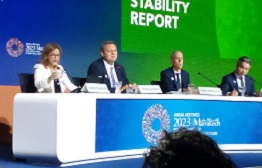By Andualem Sisay Gessesse (Marrakech, Morocco) – The recent rise of the United States Dollar will not have much impact on the emerging economies, says an expert at the International Monetary Fund (IMF).
Even though the rise in the USD will increase the borrowing cost for other countries whose debt is denominated in US dollars, the impact will not be that much strong as compared to the resilience emerging markets demonstrated over the different shocks in the past few years, according to Tobias Adrian, Director, Monetary and Capital Markets Department of IMF.
“Emerging markets have been really be incredibly resilient in these years to massive shocks. I just want to underline the fact that how impressive emerging markets perform through four years of every very adverse shocks.
“I think so the rise in US dollars will marginally impact funding cost, but I don’t think will trigger broader pressure on emerging markets,” he said. He made the remark briefing reporters on global financial stability report in Marrakech, Morocco this morning. He also indicated that “global fragmentation affect market to some degree”. It is recalled that last week the value USD has risen over most currencies of the world after going through slight decline.
The World Bank and the IMF is currently having their annual meetings in Marrakech, Morocco. During these meetings major global and regional economic issues will be discussed by participants gathered from all over the world.
In the 2023 Global Financial Stability Report launched today by the IMF, the Directors broadly agreed that risks to the outlook are more balanced relative to April 2023, but remain tilted to the downside. While the acute stress in the banking system seen in March this year has subsided, in part due to swift action in Switzerland and the United States, they broadly noted that financial stability risks remain elevated.
“In particular, Directors emphasized that persistence in global underlying inflation could warrant higher-for-longer policy rates, which could in turn trigger a correction in financial markets and capital flow volatility.”
Directors emphasized that should financial conditions tighten abruptly, adverse feedback loops could be triggered and again test the resilience of the global financial system. Directors noted that global core inflation remains persistent and declining only slowly, and stressed that monetary policy should maintain a restrictive policy stance, tailored to country circumstances, until inflation declines sustainably to target.
They called for clear and transparent communication to avoid a de-anchoring of inflation expectations. Directors also indicated that policies aimed at encouraging labor market participation can help ease labor market tightness in many advanced economies, which would support disinflation.
In the report the Directors acknowledged that the fast pace of monetary policy tightening adds further pressure on the financial sector, requiring careful monitoring of risks, better risk assessment and strengthened supervision, and closing supervision gaps in the nonbank financial sector.

